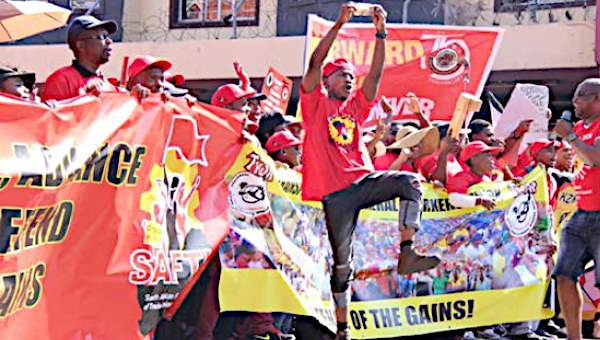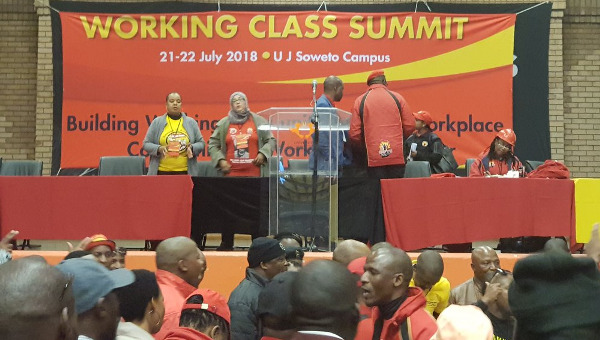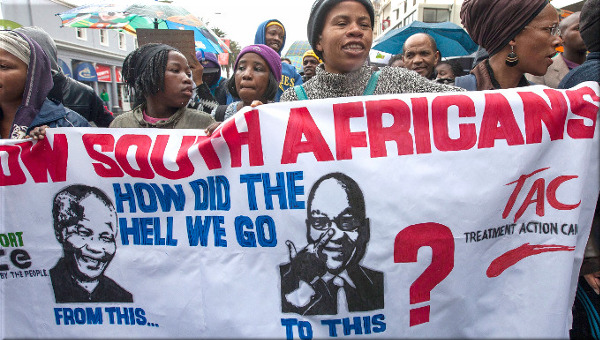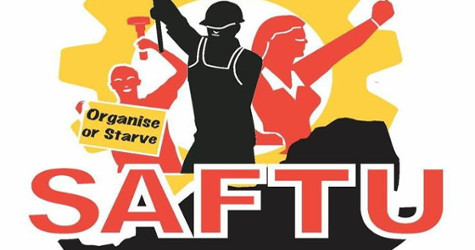Reasons to be Hopeful: Reflections on the Second SAFTU Congress
The second congress of the South African Federation of Trade Unions (SAFTU) has just drawn to a close. More than 700 delegates from all of its affiliates gathered to discuss how best to address the challenges presented by the crisis in the global economy and in South Africa. A summary of the decisions that were taken, and the issues to be addressed, are encapsulated in the SAFTU 2nd Congress declaration (published below).
I was present throughout and took copious notes of the proceedings. The mainstream media, as usual, focused on the negatives, including the internal disputes at the federation and the leadership crisis in the workers’ movement as a whole. At times the media also sought to personalise (and trivialise) the important strategic and ideological debates that helped shape the way forward.
This is not to say that differences within the movement should be glossed over. They are bound to surface under the polarising pressure of how best to respond to chronic unemployment, deep economic hardship and the escalating manifestation of a social crisis that is spawning shocking levels of violence, a host of distressing episodes of criminality, and years of neglect to infrastructure as the KwaZulu-Natal floods have just revealed. Predictably these crises always hit the most vulnerable hardest, again and again.
The congress took a step back to identify Saftu’s strengths and weaknesses over the past five years, by holding a mirror up to itself. The reflection was not always an attractive one.
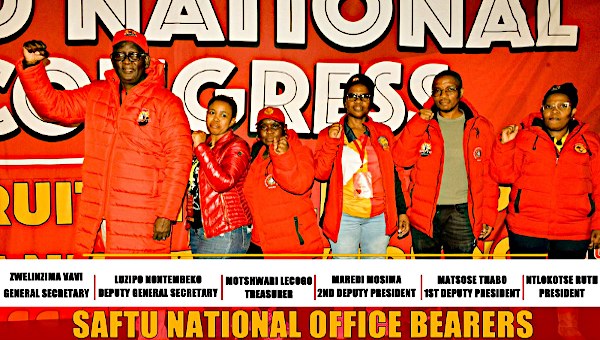
The Crisis of Representation
One very hard lesson, however, has been learnt. If leadership is divided and does not work collectively and democratically, and allows a factional mentality to take root, it can catastrophically distract from fulfilling its primary purpose: to defend and represent the interests of workers and their class.
Already, workers and the poor confront an almost unprecedented “crisis of representation”. For example:
- 76% of workers in the formal sector have no union coverage;
- Of the 24% who do, more than half have their conditions unilaterally decided by their bosses (including, more recently, huge swathes of public sector workers).
In society, increasing numbers of people ask themselves every day: Who exactly represents my interests? If it’s not my boss, my councillor, my MP or the government, then who?
Many workers feel alone, isolated and powerless. For unemployed workers it can be even worse.
Over the last period, thousands of “service delivery protests” have taken place in many of the most impoverished communities, but they remain largely invisible and unreported, except in some traffic reports! It is hardly surprising then that local communities take out their frustrations on local government representatives and properties when they are basically ignored, marginalised and “unrepresented” by those elected to do so.
But the crisis of representation is not confined to just the workplace or within communities. There is a crisis of representation in many unions too. Alarm bells are ringing if we care to listen!
The Dead-End of Populism
Disillusionment is self-evident. It is reflected in decreasing participation in elections; in the slow but unrelenting breakdown of traditional party allegiances; and in the absence of grassroots involvement within them. Participation in unions has also dramatically reduced, and many workers do not feel “covered” by their unions. Compounded, no doubt, by the paucity of distinctive and comprehensive alternatives to meet the needs of our people and empower them.
As Operation Dudula has shown, there are negative and divisive elements always ready to exploit a deepening crisis and blame “others” for the state we are in. The fact that a noisy minority of blatant and dangerous xenophobes can receive blanket mass media coverage, and de facto endorsement by unscrupulous politicians seeking to prop up their fan base, should be a source of deep concern for those who believe in tolerance, solidarity, internationalism and democracy.
There is too a reflection of xenophobic sentiment inside the workers’ movement. Workers are not immune to the institutionalised and populist xenophobic sentiment that is fondly and regularly espoused by some government ministers when they are pressed about immigration, health provision, housing and jobs.
All the more reason, perhaps, that it is important to remind worker leaders that the unity of workers, all workers, regardless of nationality and documentary status, is actually what brings about change. Not populist sloganeering that blames the presence of migrant workers among us for the ills we experience. After all, we were all migrants from somewhere once, as our family histories show.
Speaking Truth to Corruption
Just as xenophobic sentiment is present in the workers’ movement, so is corruption and the absence of accountability.
Thankfully, the “wisdom” of unions establishing investment companies is now being more thoroughly scrutinised and understood, especially after the spectacular revelations of corruption in two prominent Cosatu affiliates, and more recent revelations in other unions, including inside Saftu.
If – as some union leaders continue to remind us – capitalism is inherently corrupt, why would unions that are trying to create an alternative to capitalism build investment arms that engage in the super-exploitation of workers in the capitalist market?
It is clearly now beyond doubt that, sooner or later, the existence of an investment arm in a union will create inescapable contradictions of this nature. Despite an abundance of reassurances to the contrary, amid claims that “we will do it differently and will not be compromised”, union investment companies inevitably enhance secrecy, complicate and mythologise business decision-making, replace members’ needs with “what’s good for the business” and fatally undermine workers’ control and accountability.
They herald inappropriate expenditure and replicate the sort of insidious “back-hander” mentality that characterises much of what happens in the private sector.
Once “revenue streams” or “salary enhancements” or “perks” have been established, and dependencies and expectations are in place, it is hard to turn back the clock and restore fiduciary order.
Those establishment well-heeled “haves” who would normally fear the rise of a socialist-oriented workers’ movement, must be deeply reassured and relieved when they see unions, especially those with a track record of militancy, engage in the capitalist market via their own investment arms. For they know more than most how utterly uncompromising the profit motive is, and how it is capable of distorting and undermining whatever ethical considerations are claimed.
Never mind the impact on workers when they observe that some union leaders have adopted exclusive lifestyle choices that have more to do with accumulation than socialism and common goals!
The Reasons Behind Worker Militancy
We are witnessing sporadic but deep explosions of worker militancy in what is termed the strike season. For many, the vast profits being made are accompanied by obscene management pay rises and dividends (Sibanye-Stillwater today, Pick n Pay and others yesterday). The already very wealthy are becoming ridiculously wealthy.
This has brought home to millions that the gross inequalities that blight South Africa are not being addressed, but systematically deepened.
In the public sector, workers are still smarting from a broken pay agreement and the latest version of chronic austerity that is being visited upon all government workers and service users. It remains to be seen if the union leadership of public sector unions can “contain” the anger of their members for much longer.
Certainly, the daily reports of corruption at all levels of government and the snail’s pace of National Prosecuting Authority convictions do not help. Seeing former ministers being investigated for corruption while allowing their names to go forward for election to senior positions does not inspire confidence.
Of course, while the so-called strike season is upon us, there will be those commentators who continue to bleat from the margins that “strikes and other forms of industrial action are self-defeating”. They will do the arithmetic and write that workers on strike will lose far more financially than they will ever regain by their “excessive” demands and industrial action.
First, what these “sensible” commentators will not say is that South Africa is not a poor country. The majority of its people are poor, but there is an abundance of wealth, a surplus of wealth, which the wealthy do not need and which sits in bank, investment and offshore accounts accumulating for no social purpose whatsoever.
Does the chairperson of Sibanye-Stillwater really need an increase of R300-million? All of that unused wealth should be put to good purpose and get people working, to rebuild infrastructure, provide the services our people need and make our country environmentally secure.
Second, the trope that workers lose financially when taking industrial action indicates that some commentators have either not spoken to the workers involved or have any idea of the lives that workers lead. Of course, their purpose is to please their editors and other vested interests, but let us help them see it differently.
Step Into a Worker’s Shoes
For a start, imagine that for the past five years you have been plagued by earning less than a living wage, that well before the next payday your monthly salary or weekly wage has been used up and it is time to juggle loans and placate those you owe already.
Imagine if, on top of this, you are mistreated like a chattel by the boss, who has you over a barrel because the boss can hire and fire at will, and there are many desperate others ready to take your place, and for less pay.
Imagine what it is like to have the constant worry of household bills, school fees and rising food prices that you can barely keep up with.
Imagine praying that nothing disastrous will happen in the household that will require resources that you do not have.
It is precisely these conditions that are the daily experience of millions of workers.
Now imagine that, for once, you band together with others and conclude that enough is enough after years of struggling to make ends meet, and decide to go on strike. It’s not an easy decision. What do you tell them at home?
If our “sensible” commentators took the time to go and interview and listen to workers, they would soon realise that workers have already done the arithmetic, have thought through the consequences of going on strike, know full well that what they are doing will create hardship and hurt those loved most, and yet they still persist! If you doubt this, go speak to Clover workers or the miners on strike!
The simple answer is that workers who seek a collective response to their exploitation and oppression soon realise that, despite everything, they have power. They realise they are not alone and marginalised. They are surprisingly not afraid of the consequences or intimidated by threats.
When they stand together, they can support one another, rather than compete, and for once they can put their collective and personal needs first. They know their companies and departments intimately and how they function. They can say with authority that there are resources and profits that are available and can be used to outlaw poverty pay and conditions.
They will even say that, if the bosses cannot and will not pay a living wage, then they deserve to go out of business, and the business or licences should be taken from them.
Living in a state of super-exploitation for years is not living at all, it is not humane, it is not bearable, it is not what a democracy is supposed to be about. In other words, while workers engaging in a strike might well lose out on their income in the short term, they will gain something far more powerful and lasting: class consciousness and class confidence.
There is nothing romantic or mythical about this. Go speak to workers and be educated!
More Precious than Gold
The challenges we face as a workers’ movement look formidable, and they mostly are, but last week at the Saftu congress, I witnessed hundreds of worker leaders, across all unions, all provinces and localities, women and men of all ages, engage in a collective exercise of understanding the nature of our society and the crisis it is in.
Equally importantly, I watched them reflect on their own actions and practices, grappling with what needs to be done to free South Africa and beyond from misery.
It’s a privilege to be among workers who are in the process of recognising what must be done to build their own class power and the possibilities of creating a society free of exploitation. That’s class consciousness, and it’s priceless. •
SAFTU 2nd National Congress Declaration
We, the 709 voting delegates to this 2nd National Congress of the South African Federation of Trade Unions, hereby declare that we are alive and kicking! This Federation shall stand shoulder to shoulder with the working class in their battles and promote a socialist alternative to the capitalist crisis.
We must be wise enough to acknowledge that we have made mistakes that have paralysed and caused unnecessary divisions. This has not been in the interests of the trade union movement or of the working class as a whole. Despite the negative media coverage shown at the opening of our National Congress, the reality is that we were realigning our perspectives in the face of a brutal capitalist onslaught. All sides in the Federation have acknowledged that it is time to move on and look outwards.
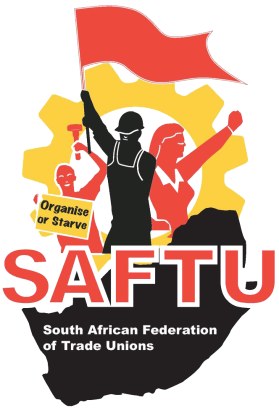
We have defied the prophets of doom. We have demonstrated that in our movement we have the most experienced cadres that will not forsake the interests of workers. Four out of six of our newly elected National Office Bearers are women. Halala! We have moved away from an encroaching paralysis toward reaffirming the cornerstones for reviving Saftu and the trade union movement as a whole.
It is a sign of our growing maturity that contestations which have taken place in the Federation, reflected here in this National Congress, were political and ideological but certainly not intended to be personal. Worker’s democracy and worker control are the ultimate victors in this National Congress, not this or that faction or this or that slate. With this leadership, we must re-energise and mobilise our existing members. We must also turn outwards, toward the millions of workers that are yet to become organised, and bring them into our unions and to strengthen their struggles.
The parliament of workers has spoken!
- We declare that we have reaffirmed the distinctive principles espoused at our inaugural National Congress in 2017;
- We declare that we are moving beyond divisiveness in favour of principled unity and recommit to building a fighting trade union movement guided by Marxism;
- We declare that Saftu remains a vital voice of organised, unorganised, and marginalised workers;
- We declare that we will move toward financial sustainability and strengthen the dues base of the Federation, whilst addressing the issue of mergers and consolidating our membership;
- We declare that we must build our affiliate’s capacities through worker education, worker-focused research, and legal training;
- We declare our commitment to a systematic programme to launch all provincial and local structures as war councils to represent working-class interests;
- We declare our commitment to recruit, mobilise, and galvanise the working class, targeting the 76% of non-unionised workers, some of whom we have not yet reached and some of whom have lost faith in organised labour;
- We declare that we must seek to work together, in solidarity, with other trade union federations, unions, and worker-orientated organisations to protect workers against consistent and unrelenting attacks from capitalists and their system. We need unity in action – on the ground – not just simply declared;
- We declare that we must unite the forces of the Left and convene the socialist conference;
- We recognise that increasing levels of outsourcing, subcontracting, and other forms of precarious employment – such as EPWP and community health workers – and the failure of the labour movement to adequately respond to this trend further contribute to the ongoing fragmentation of worker unity. We must also reach out to informal sector workers and migrant workers. Saftu boldly commits to lead the movement in reversing this trend, engaging with these workers, and building worker trust, to grow a united trade union movement – this is our historical task and an urgent priority;
- We declare our commitment to the campaign for a living wage for all workers. The poverty minimum wage is an insult and is insufficient to meet even the most basic needs of working-class households;
- We declare our commitment to a programme of action against business-backed government austerity, especially in the public sector that needs more money, not less, to provide effective, caring services to the public. We will oppose any further legislative restrictions that undermine working-class power.
This Federation will take forward the struggles of the working class, without fear and without hesitation. Every day workers are facing an onslaught from the global capitalist system. Neoliberalism seeks to wipe out all the gains that workers have made. Day after day, workers are being attacked – in their workplaces, in their homes – all over this country and the world.
We declare that we will stand united against all these onslaughts:
- We stand against gender-based violence and violence toward children;
- We stand against the triple crisis of unemployment, inequality, and poverty;
- We stand against climate change and the devastating effects felt the most by ordinary workers, as we have seen with the devastating floods in KwaZulu-Natal;
- We stand against xenophobia and the rising tide of right-wing extremism;
- We stand against police killings and all violence against public servants;
- We stand against the super-exploitation of Africa and the Global South and pledge to deepen our international solidarity – in Eswatini, Capo Delgado in Mozambique, Western Sahara, Palestine. We regard internationalism as a fundamental principle of the workers’ movement;
- We stand against imperialist war. All imperialist wars are about expanding capitalist markets and the exploitation of workers. We believe the mutual class interests of Russian and Ukrainian workers should not be sacrificed to imperialism;
- We resolutely stand against all forms of class oppression, racism, sexism, and all forms of divisiveness.
Despite the crisis we are in, our class continues to fight. Amcu and NUM have shown this in the gold sector strike. Fawu and Giwusa and CSAAWU have shown their solidarity during the Clover strike. NUM and Numsa have stood together against Eskom. We call on the public sector unions to follow these examples and draw their struggles together. We call on all trade union leadership to recruit more, mobilise more, educate more, and build the cadres of the working class.
We say to all of them: Do not yield! Be militant! Forward with your struggles! Forward with unity! Forward with the working class! Gcina, amasebenzi, gcina!
We know who the enemy is. The enemy is the capitalist class and their cronies. They steal from workers, every single day. In this world, everything produced comes from the hands of workers. It belongs to them! We strive to represent and provide democratic leadership for workers. We stand together in solidarity. Forward ever, backward never.
Workers of the world unite! You have nothing to lose but your chains! •
This article first published on the Daily Maverick website.


